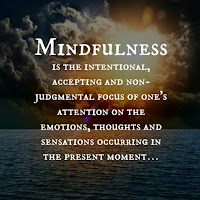MOTIVATION
Dan Ariely outlined what motivates us to work is a sense of purpose. Reflect on what motivates you at work and what gives you a sense of purpose. Why do you do what you do? What do you hope to achieve through your work? In considering how you are motivated, how can you discover not only your own personal fulfillment but that of your followers?
It's interesting how things come at the right time in your life. This chapter and assignment, for example, is coming at my tenure as the Support Section Chief and has helped me reflect on my experience while looking forward to my next position. I started this in this position 15 months ago and dreaded it as I did not know what to expect. However, I cannot express enough how much I have enjoyed my time here.
 My Chief at the time said they needed someone in the seat to "fix" things and he trusted my leadership. I thought he was trying to pull a fast one on me. My entire Air Force career, I've only heard bad things about Support sections and that that's where they send the useless/broken individuals. While this was somewhat true, there were also a lot of Airmen that just got forgotten about. The first few months were hard... learning 31 new programs and managing 35 Airmen by myself. Not to mention the fact that discipline and accountability were non-existent. I worked hard to turn things around, my goal was to build a team. After getting rid of a few bad apples and churching up some programs, I found different ways to increase morale such as dress-up days. I worked very long hours, skipped lunches, and got midnight calls to put out fires. The hardest part was dealing with drama and unexpected craziness that comes along with "leading people". In the military, we have an obligation to ensure our Airmen our physically, mentally, socially and spiritually ready to accomplish the mission at all times. That means, if they have personal, marital, financial, medical or other issues, we as NCOs must be aware and mentor/help them until the issue is resolved. This requires a lot of time, patience and understanding. Unfortunately, I had a lot of Airmen with "issues". Through all the ups and downs, it made me more motivated. Accomplishing the mission, with increasing results, while also mentoring and guiding my Airmen was incredibly rewarding.
My Chief at the time said they needed someone in the seat to "fix" things and he trusted my leadership. I thought he was trying to pull a fast one on me. My entire Air Force career, I've only heard bad things about Support sections and that that's where they send the useless/broken individuals. While this was somewhat true, there were also a lot of Airmen that just got forgotten about. The first few months were hard... learning 31 new programs and managing 35 Airmen by myself. Not to mention the fact that discipline and accountability were non-existent. I worked hard to turn things around, my goal was to build a team. After getting rid of a few bad apples and churching up some programs, I found different ways to increase morale such as dress-up days. I worked very long hours, skipped lunches, and got midnight calls to put out fires. The hardest part was dealing with drama and unexpected craziness that comes along with "leading people". In the military, we have an obligation to ensure our Airmen our physically, mentally, socially and spiritually ready to accomplish the mission at all times. That means, if they have personal, marital, financial, medical or other issues, we as NCOs must be aware and mentor/help them until the issue is resolved. This requires a lot of time, patience and understanding. Unfortunately, I had a lot of Airmen with "issues". Through all the ups and downs, it made me more motivated. Accomplishing the mission, with increasing results, while also mentoring and guiding my Airmen was incredibly rewarding.
I am nervous to leave and start my next journey as a Production Superintendent. My team is built and now I have to hand it over to another leader to continue what I've started. However, I'm hopeful because I want to keep making a difference and I will have a new platform to do that. I want to lead and mentor. My on-aircraft experience is lacking, especially on the B-2, so I have a lot to learn. That part is also motivating as I enjoy learning new things. With this new position, I will also have the opportunity to directly impact the mission. As Dan Ariely stated, I care about the fight...the challenge.(2013)
This video and assignment made me reflect on what motivates my followers. I feel the ownership piece is definitely a contributor. In Support Section, the Airmen would manage programs and felt pride (or shame) at the success of their programs. On the flight line, we have Dedicated Crew Chiefs (DCC) whose names are painted on the side of the aircraft, they "own" that plane. For those who are not DCCs, it may be more challenging to find out what it is that motivates them. However, Ariely's explanation of the Meaningful and Sisyphus experiments definitely gave me ideas on how to motivate them. He said by simply looking at something that someone has done, increases motivation. (2013) With my new position, and my lack of B-2 experience, I intend on asking a lot of questions and going out to see how and what the Airmen are working on. This will let them take ownership of their tasks by acknowledging their work while learning new things myself.
Whetton, D. A. & Cameron, K. S. (2016). Developing management skills, 9th ed. Boston, MA: Pearson.

















